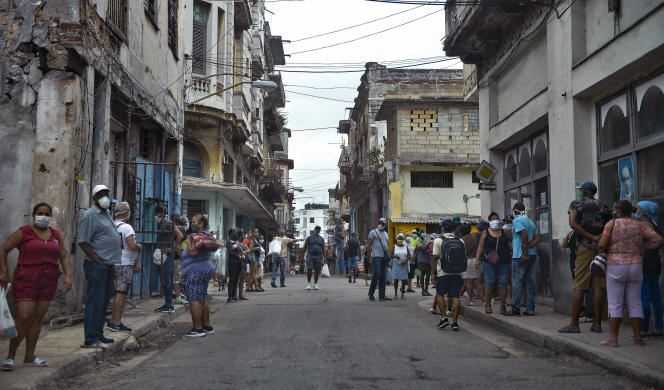In front of the conveyor belts at José-Marti airport in Havana, Cuba, three, four, even five enormous suitcases are piling up on each of the carts of passengers coming from Madrid or Toronto in mid-July. Luggage overflowing with products that cannot be found on the island. “I bring shampoo, powdered milk, biscuits, pasta, cans of tuna and sardines, shoes, medicines … Everything, because they have nothing”, sums up a passenger who came to see her family, and who prefers to remain anonymous.
The diaspora did not wait for the announcements of Cuban leader Miguel Diaz-Canel to travel loaded like a mule, in order to relieve the misery of its compatriots. On July 14, three days after unprecedented and massive demonstrations against the regime, the president indeed authorized, “In an exceptional and temporary way, the importation by passengers, in their suitcases, of food, hygiene products and medicines, without limit of value and without customs taxes”, to alleviate recurring shortages on the Caribbean island.
Other initiatives have been taken to come to the aid of the country and calm a growing popular anger which threatens the continuity of the regime by associating the cries ” We are hungry “ and “Down with the dictatorship”. Usually reluctant to receive humanitarian aid, the Cuban regime this time made the request itself and several countries responded to its call.
On July 26, Russia sent 88 tons of humanitarian aid to Cuba, distributed in two Antonov An-124 cargo planes containing mainly wheat flour, canned meat, sunflower oil and masks. surgical. On July 27 and 28, Mexico sent from the port of Veracruz two boats loaded with food, medicine, oxygen tanks to counter the outbreak of the Covid-19 epidemic, and fuel to make up for the cuts. electricity. China has donated around 30 artificial respirators. On July 30, a Bolivian air force plane carried 20 tons of humanitarian aid. The food – mainly rice, cereals, pasta, oil and sugar – will be distributed free of charge to all households, explained Cuban Minister of Internal Trade, Betsy Diaz.
Harvested products that do not arrive in town
Because at every corner of Havana, under an unbearable humid heat, endless lines form in front of all kinds of stores to buy chicken, coffee or laundry. Forced to queue for hours to eat, Cubans no longer hesitate to complain out loud about the government, the lack of food, the limited quantities fixed by the ration book and the proliferation of free cash shops. convertible (MLC), where only payment in foreign currency is accepted.
You have 64.63% of this article left to read. The rest is for subscribers only.
